DESIRES, STONES, SKY IN SHREDS
Spanish Republican Women in the Resistance
Electroacoustic music installation and interviews, 2002
Spatial music for 4 loudspeakers, flute sounds and voice: Ebba Rohweder
Interviews: Carmen Camaño, Toñita Garcia, Clotilde Alonso, Dolores Rubio, Demetria Medina Santos and Isabel Sanz Toledano
The interviews are taken from the book El silencio roto. Mujeres contra el Franquismo (The Broken Silence. Women against Francoism)
by Fernanda Romeu Alfaro
The work was produced at LIEM-CDMC, Madrid in 2001 and the spatial sound mixing
at the Electronic Studio of the Technical University TU Berlin in 2002
Premiere: 2003, Edificio Antonio Saura, Facultad de Las Bellas Artes, Cuenca.
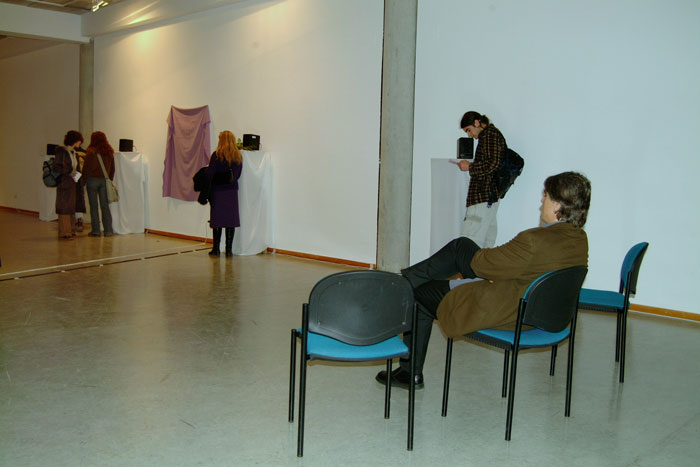
Premiere at the Faculty of Fine Arts, Cuenca, 2003
|
| The installation DESIRES, STONES, SKY IN SHREDS is a tribute to the Republican women in the resistance during the Spanish Civil War and the early years of Francoism. There are 10 speakers - 4 for the electroacoustic music and 6 for the interviews. The electroacoustic music is a four-channel spatial composition developed at the Technical University of Berlin. In the four corners of the room there are loudspeakers and the sounds of the electroacoustic composition move throughout the space.
The basis of the electroacoustic music are analogue sounds of flutes and voice manipulated with the program (ProTools), with plug-ins, cuts, montages or layers, so that only at some points it is possible to recognise the origin of the sounds.
Part of this installation is made up of six interviews collected from the book El silencio roto. Mujeres contra el Franquismo (The Broken Silence. Women against Francoism) by the historian Fernanda Romeu Alfaro.
In these original testimonies, the women talk about their history: about their rebellion against the dictatorship, the clandestinity, the persecutions, the arrests and their time in prison. The six loudspeakers for the interviews are mounted on the walls of the room at head height. The volume is so low that the audience has to get close to each speaker to understand the words. The interviews are of varying lengths - between 7 and 30 minutes - and are repeated continuously.
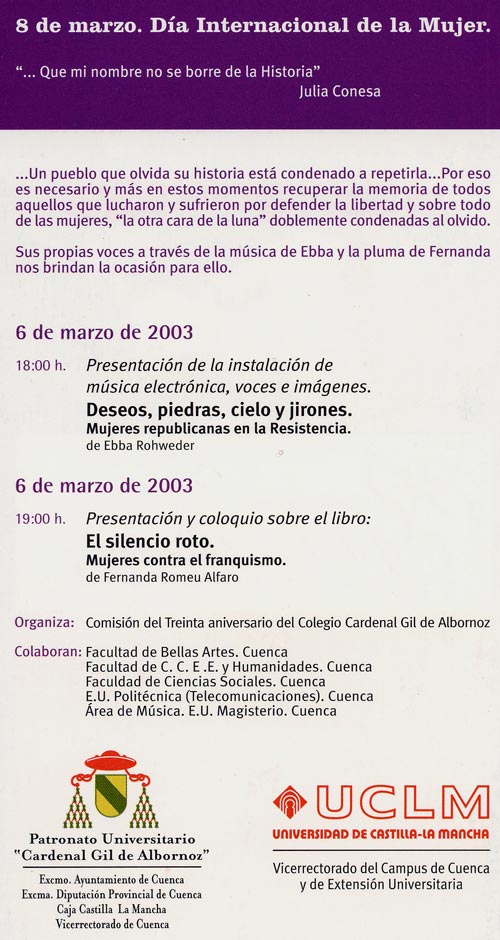
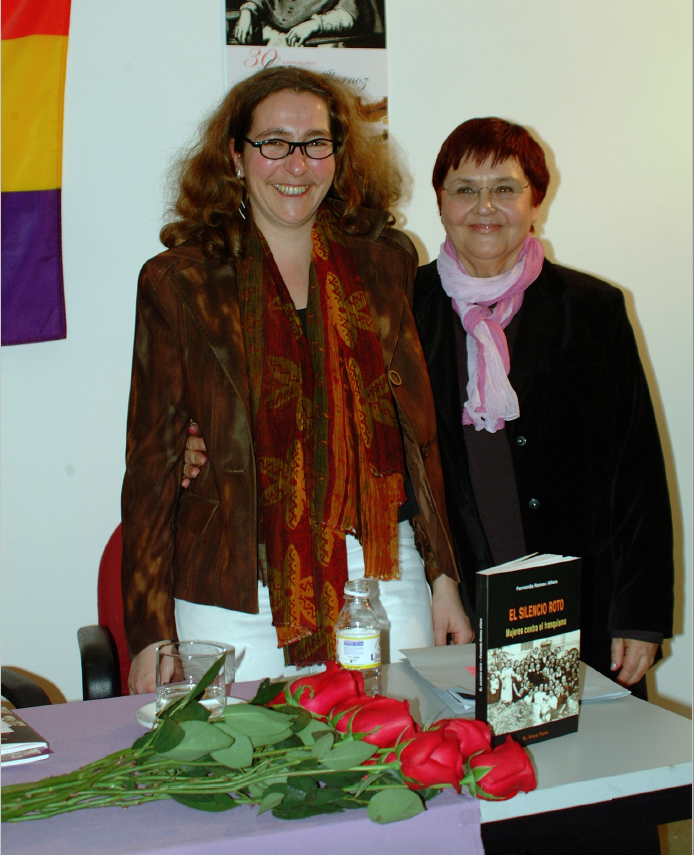
Faculty of Fine Arts Cuenca, presentation of the book El Silencia Roto - Mujeres contra el franquismo (Broken Silence - Women against Francoism) by Fernanda Romeu, El Viejo Topo, 2002
|
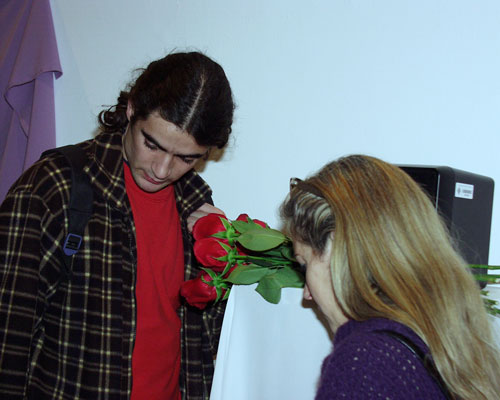
Premiere at the Faculty of Fine Arts, Cuenca, 2003
Some quotes from the interviews
Demetria Medina Santos: "I was born in Ventas - Peña Aguilera, in 24. My father was a hunter, mower and charcoal burner. I helped him with what he did, mowing or preparing the charcoal oven...I never went to school because I had to work to be able to eat...my father's family were mostly left-wing, all of them, you could say all of them...Well, it turns out that the Falangists came, so between the villagers and the Falangists you can imagine those who were imprisoned: they beat them, they pulled their hair out from the hair pulling they did, and my mother went to clean up their blood. ...they kept us for a whole week or more, bald, going around the village. Every day, for an hour or an hour and a bit, which was going around the village...What happened is that we were afraid to go down to the village, because, of course, as you were bald and if you went down...I was very young. I must have been 15 or on my way to 16".
Toñita Garcia: "I attended the first women's organisation.... In Madrid, in the East Cemetery...They were organised in the walls of the East Cemetery, where we went, the women would go to see if they had killed their husbands to find them. So at 11 o'clock in the morning you were allowed to enter the walls and there you saw the women recognising their children or their husbands or their fathers. I said: we have to do something, we have to organise ourselves, we have to help each other and make the help effective...because it was a necessity, we had no money, we had no food and the children had no clothes and we were also watched and they were looking for us...So it wasn't a written thing of women's organisation, but it was the first group that organised itself on the walls of the women's cemetery".
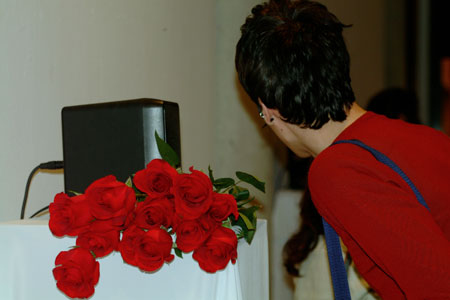
Premiere at the Faculty of Fine Arts, Cuenca, 2003
Carmen Camaño: "I am Carmen Camaño, I am now quite old, since I was born in 1909.... When the war broke out, I started working in the Ministry of Public Instruction... From Valencia, as I was married at that time, I was assigned to the Library of the Institute of Alicante and in the Library, I applied for the Party. At that time Guardiola was secretary of the Provincial and they put me to work as head of the women's secretary... The war ended and we went to Alicante thinking that we would leave by boat from there, but I was pregnant and when we arrived in Alicante, the boat left the day after I gave birth. And I couldn't get on board, because I had very heavy haemorrhages...And then they arrested me, my husband and the child...And in Alicante they put us straight into prison...yes, my son was five days old when we went to prison, and he got out when he was one year old. Because after a year they said that we no longer had to breastfeed him and they took him out. I took him out and some friends took him...and these friends kept him until we got out of prison and he came back to live with us. He was eight years old..."
|




